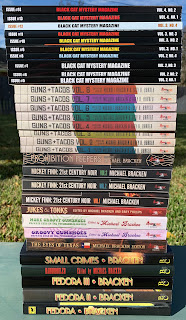 |
| Some of the many reasons Michael doesn’t have much time for pleasure reading. |
For every short-story manuscript I read that ultimately sees publication in one of my projects, I read at least two that don’t. So, reading for entertainment and pleasure has almost disappeared because I now read a significant amount of unpublished fiction.
And I’m becoming jaded. A few years ago, when I wasn’t doing as much editing, I had time to work with stories that showed potential, and I could work with writers who showed potential but hadn’t made the leap to regular publication. These days, I’m looking for stories that are as close to publication-ready as possible.
That means I’m doing fewer open-call projects (as a percentage of total projects). (The Mickey Finn: 21st Century Noir anthology series remains open call and Black Cat Mystery Magazine, when it reopens to submissions at some indefinable date in the future, will also be open call.) Instead, I’m mostly working with writers who have proven they can deliver on-time and on theme, and who have proven themselves easy to work with through the revision and/or editing process.
EDITORS’ RESPONSIBILITIES
I’ve been involved in several discussions recently where it has been clear that writers don’t understand all that editors do. They see “editors” as people who fix spelling, grammar, and punctuation errors and maybe point out plot holes and faulty story structure.
That’s part of what they do. In fact, if it’s an editor hired by the writer, that may be all they do.
But an anthology or magazine editor does much more than that. When working on an anthology, editors develop the concept and pitch the idea to a publisher (or work with an organization or publisher who presents the concept to the editor), determine how to obtain content, work with writers to ensure that content fits within the concept, prepare manuscripts for publication, and proofread galley proofs and/or page proofs. (FYI: No one produces galley proofs these days.) A magazine editor—especially the editor of a small-press magazine—does much the same.
In short, an anthology or magazine editor—especially those working with smaller presses—is often a concept generator, acquisitions editor, development editor, fact-checking editor, line editor, copy editor, and proofreader all rolled into one.
While doing all of this, editors maintain records, ensuring they know what stage each manuscript is at; maintain contact with writers to ensure all deadlines are met; and maintain contact with the publisher’s staff to ensure all deliverables are on time and in the correct format.
Editors’ responsibilities continue after publication. They may be involved with marketing and promotion, and a good editor ensures the work they publish is considered for all appropriate awards and best-of-year reprint opportunities.
DISCOVERING GEMS
What compensates for a decreasing amount of time for entertainment and pleasure reading is finding story gems in the submission queue, regardless of whether the stories were solicited via an invitation call or unsolicited via an open call, and then shepherding those stories into the world where readers can find them.
Knowing I played a small part in entertaining readers when these stories appear more than compensates for all the reading pleasure time I’ve given up.
“Got Milk?”—a blog post about how Temple’s great uncle was indicted for his involvement in the Louisiana Milk Strike of 1947 and how my father-in-law’s research led me to write “Spilt Milk” (Alfred Hitchcock’s Mystery Magazine, November/December 2023)—was published at Trace Evidence.

This is a great condensed overview of all you (or any other first-rate editor) does for the rest of us, Michael. So, on behalf of everyone who benefits from your work behind the curtain, Thank You.
ReplyDeleteThanks for this very informative post, Michael! I am reminded of being a college fiction writing teacher (30 years of it) where I had to read so many manuscripts by unpublished writers. I'd get desperate for a really good read in my 'leisure' reading time. Now, I minimize my time on juries, etc, as I've read so much I don't want to read over the past 30 years.
ReplyDeletePoop! That was Melodie above.
ReplyDeleteI echo Steve. Nothing like a great editor.
ReplyDeleteOn a separate note, I'm not clear about the job descriptions of copy editors and line editors. What doth they do?
To quote from https://nybookeditors.com/2015/01/copyediting-vs-line-editing/ because they explain the difference quite nicely:
Delete"[A] line edit focuses on the way you use language to communicate your story to the reader. Is your language clear, fluid, and pleasurable to read? Does it convey a sense of atmosphere, emotion, and tone? Do the words you’ve chosen convey a precise meaning, or are you using broad generalizations and clichés?"
A copyedit addresses "flaws on a very technical level – to make sure the writing that appears on the page is in accordance with industry standards. This is like an incredibly high-end proofread."
And:
"[I]t is not the specific purpose of a line edit to comb through your prose, fix your grammar, typos, capitalize proper nouns, or change all spellings of colour to color because we’re in America, not Britain.
"This is the job of a copyeditor, and it requires a rule-based understanding of standard American English usage that traditional editors don’t have. As such, your copyedit will come with a 'style sheet' that explains how these rules and principles apply to specific things in your manuscript. So while your general editor will probably not have the Chicago Manual of Style committed to memory, your copyeditor might."